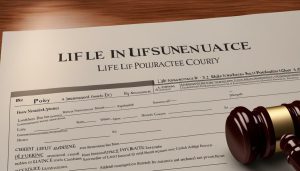Introduction:
When it comes to life insurance claims, many policyholders and their loved ones wonder whether life insurance companies check medical records after the policyholder’s death. While the answer is not straightforward and can vary depending on various factors, it is essential to understand the role medical records play in the claims investigation process.
Key Takeaways:
Key Takeaways
- Medical records can play a crucial role in life insurance claims investigations.
- Insurance companies may request medical information to verify the cause of death.
- Not all life insurance policies require a thorough review of medical records after death.
- The privacy and confidentiality of medical records are legally and ethically protected.
- Policyholders should carefully review their insurance policies and understand the claims process.
Understanding the Life Insurance Claims Process
Filing a life insurance claim can be a daunting task, especially during a time of grief. It is essential to understand the steps involved in the process and the information required by insurance companies.
The first step in filing a claim is to notify the insurance company of the policyholder’s death. The insurance company will then provide you with the necessary forms and instructions to complete the claim. The forms will typically require basic information about the policyholder and the beneficiary, as well as the policy number and the cause of death.
In addition to this basic information, insurance companies may request medical information to verify the cause of death and assess the policyholder’s health status. Medical information may include medical records, autopsy reports, and death certificates. It is important to note that insurance companies may not require medical information for all claims.
Once the insurance company receives the claim forms and any required medical information, they will begin to investigate the claim. This investigation may include reviewing the policy terms and conditions, interviewing witnesses, and examining any other relevant documents or evidence.
After the investigation is complete, the insurance company will determine whether to approve or deny the claim. If the claim is approved, the insurance company will typically issue a check to the beneficiary for the death benefit amount specified in the policy.
It is important to note that the life insurance claims process can vary depending on the policy’s terms and conditions, the cause of death, and the amount of the death benefit. It is essential to carefully review your insurance policy and understand the obligations and procedures involved in filing a claim.
The Importance of Medical Records in Life Insurance Claims
Medical records play a crucial role in life insurance claims. Insurance companies may request medical information to assess the policyholder’s health status and verify the cause of death. The review of medical records is typically part of the insurance policy investigation process.
Medical records provide valuable insights into the policyholder’s health history and can help determine whether the policyholder had a pre-existing medical condition that may have contributed to their death. Insurance companies may also use medical records to confirm whether the policyholder had made any false statements on their insurance application.
During the insurance policy investigation, insurance companies may request medical records from a variety of sources, including hospitals, medical practitioners, and the policyholder’s family members. The review of medical records is typically conducted by trained medical professionals, such as doctors or nurses, who are bound by strict confidentiality and privacy laws.
It is important to note that the review of medical records is not a universal practice. The extent to which medical records are reviewed can vary depending on the insurance policy’s terms and conditions, the cause of death, and the insured amount. For instance, if the policyholder dies from natural causes, the insurance company may not request a review of their medical records.
Overall, medical records are an essential part of the insurance policy investigation process. They provide valuable insights into the policyholder’s health status and can help insurance companies determine the validity of a life insurance claim.
Post-Mortem Medical Records and Death Investigations
There may be cases where life insurance companies need to request post-mortem medical records or initiate death investigations to gather additional information regarding a policyholder’s health status and cause of death. These measures are typically taken when the cause of death is uncertain or if it appears the policyholder had a pre-existing medical condition that was not disclosed.
Post-mortem medical records are medical records created after the death of a person. These records may include autopsy reports, toxicology reports, and medical histories. Insurance companies may request these records to help verify the cause of death and assess the policyholder’s health status at the time of death.
Death investigations may also be conducted by insurance companies. These investigations may involve reviewing medical records, speaking with family members or witnesses, and conducting interviews with healthcare professionals who treated the policyholder. These investigations are typically conducted by specialized insurance adjusters or private investigators.
The use of post-mortem medical records and death investigations can be controversial. Some individuals may be uncomfortable with their medical records being accessed after their death, or they may feel that the investigation process is intrusive and disrespectful. However, from the perspective of insurance companies, these measures are necessary to ensure that insurance policies are being used appropriately and that fraudulent claims are not being filed.
Privacy and Confidentiality of Medical Records
One of the most significant concerns surrounding the use of medical records in life insurance claims is the issue of privacy and confidentiality. Medical records contain sensitive information about an individual’s health, including diagnoses, treatments, and medications. Therefore, it is essential to ensure that medical records are handled with utmost care.
Insurance companies are bound by law to protect the privacy and confidentiality of personal information, including medical records. They must comply with federal and state privacy regulations, such as the Health Insurance Portability and Accountability Act (HIPAA). These laws set strict standards for the collection, use, and sharing of personal health information.
Insurance companies are required to obtain the policyholder’s consent before accessing their medical records. They must also provide a clear explanation of how the information will be used and disclosed. Policyholders have the right to review their medical records and request corrections if necessary. They can also revoke their consent at any time, effectively prohibiting the insurance company from using their medical records in the claims process.
Insurance companies must also have robust security measures in place to protect medical records from unauthorized access, use, or disclosure. They must ensure that only authorized individuals are granted access to the information, and that the information is stored securely and destroyed appropriately according to legal requirements.
In summary, privacy and confidentiality are critical considerations when it comes to the use of medical records in life insurance claims. Insurance companies must comply with strict legal and ethical standards to ensure that medical records are accessed, used, and disclosed responsibly.
Factors That Determine Medical Record Review
Not all life insurance policies require a thorough review of medical records after the policyholder’s death. The investigation process can vary depending on several factors.
- Policy terms and conditions: The policy’s terms and conditions can dictate whether medical records need to be reviewed. Some policies have a clause that allows insurance companies to request medical information if the policyholder dies within a specific timeframe.
- Cause of death: Insurance companies will also investigate the cause of death to determine if it is covered by the policy. If the cause of death is not immediately apparent or requires further clarification, medical records may be reviewed.
- Insured amount: The amount of the insured can also influence whether insurance companies will request and review medical records. For example, if the insured amount is significant, insurance companies may conduct a more thorough investigation to ensure that the claim is legitimate.
It’s essential for policyholders to understand the factors that impact the investigation process and the policy’s terms and conditions associated with a life insurance policy.
Conclusion
In conclusion, the extent to which life insurance companies check medical records after death can vary depending on various factors. While medical records are often requested and reviewed during the claims process, it is not a universal practice. It is important for policyholders to carefully review their insurance policies and understand the obligations and procedures involved.
Policyholders must also understand the importance of medical records in the claims process and ensure their accuracy and completeness. They should be aware of their rights to privacy and confidentiality of their medical information and inquire about how insurance companies handle sensitive information.
Factors such as the terms and conditions of the policy, the cause of death, and the insured amount can influence whether insurance companies will request and review medical records. Therefore, it is crucial for policyholders to consider these factors when selecting an insurance policy and be transparent about their medical history.
Overall, while medical records play an essential role in life insurance claims, the investigation process can be complex, and the outcome can be influenced by various factors. Policyholders should educate themselves and seek guidance from insurance professionals to ensure they understand the claims process and their obligations.
FAQ
Do life insurance companies check medical records after death?
Yes, life insurance companies may check medical records after the death of a policyholder as part of the claims process.
What is the life insurance claims process?
The life insurance claims process involves filing a claim with the insurance company and providing necessary documentation, such as medical records.
Why are medical records important in life insurance claims?
Medical records are important in life insurance claims as they help insurance companies assess the policyholder’s health and verify the cause of death.
When do life insurance companies request post-mortem medical records or initiate death investigations?
Life insurance companies may request post-mortem medical records or initiate death investigations to gather additional information about the policyholder’s health and cause of death under certain circumstances.
What about the privacy and confidentiality of medical records?
The privacy and confidentiality of medical records are important considerations. Insurance companies must adhere to legal and ethical standards when handling sensitive medical information.
What factors determine whether life insurance companies review medical records?
Factors such as the policy’s terms and conditions, cause of death, and insured amount can influence whether insurance companies will request and review medical records.
What can policyholders do to ensure a smooth claims process?
Policyholders should carefully review their insurance policies, understand their obligations, and provide accurate and complete information to ensure a smooth claims process.



Average Rating